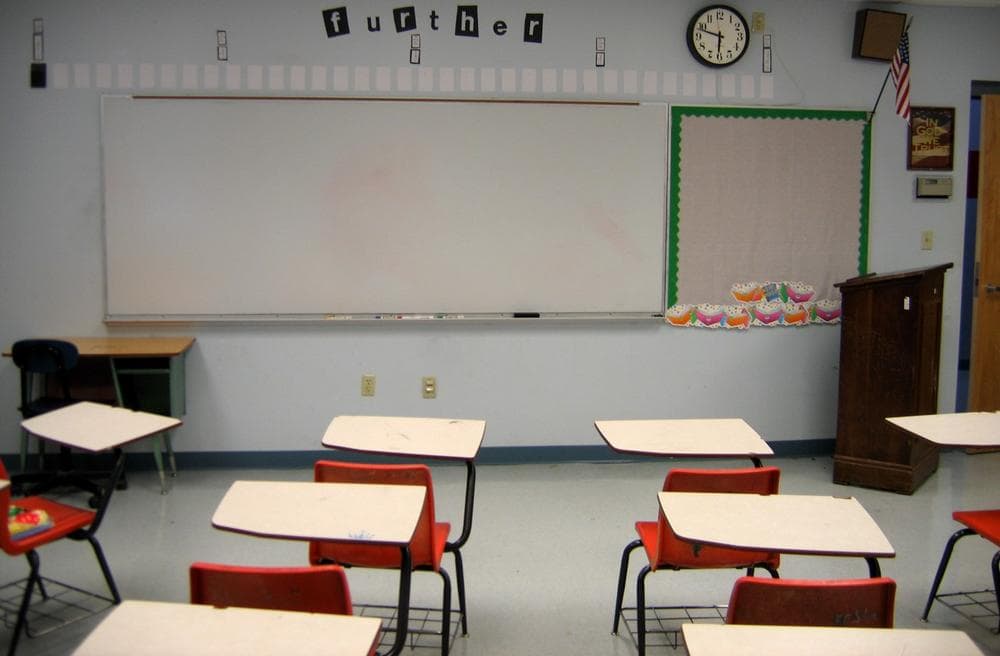Advertisement
Grading The 4-Day School Week: The Impacts On Budgets, Education And More

With Meghna Chakrabarti
A report card on the four-day school week. Cash-strapped districts across the country are doing it. How well is it working?
Guests
Chris Fiedler, superintendent of the 27J school district, the first school district in the Denver metro area to move to a four-day school week. (@SD27J)
Paul Hill, founder of the Center on Reinventing Education (@CRPE_UW). Research professor at University of Washington Bothell (@UWBothell).
Jon Turner, assistant professor at Missouri State University's College of Education. Author of several studies on four-day school calendars in Missouri. Former Missouri school district superintendent. (@JonTurnerEdD)
From The Reading List
NBC News: "A four-day school week? Teachers and kids give it an 'A.' Parents are less enthusiastic" — "Emma Cable, a junior at Eagle Ridge Academy in this working-class suburb north of Denver, spends her Mondays at volleyball practice and volunteering at a seeing-eye dog organization. Isabelle Jaramillo, a third grader at Northeast Elementary, spends hers at the local Boys & Girls Club, while Angelica Gallegos, a sixth grader at Vikan Middle, and her brother, Paul, a fourth grader at Pennock Elementary, go with their mother to Barr Lake State Park.
"Different grades, different activities and one thing in common: None of these students spend that day in class.
"That's because their school district, 27J Schools in Adams County, Colorado, switched to a four-day school week at the start of this school year as part of an effort to recruit and retain better teachers. With 28 schools and about 18,000 students, it was the first district in a major metropolitan area and the largest school district in the United States to make the change, though it's been a growing trend among rural districts.
"Now, at the end of the experiment's first year, those affected gave it mixed reviews. While kids and teachers relished the regular long weekends, parents did not. Those with younger kids worried about child care, and those with older children worried about the unstructured free time."
Newsweek: "Are 4 Day Weeks The Answer To Problems Facing America's School Districts?" — "As funding questions persist and states face the possibility of West Virginia-style teacher strikes, more school districts across the country are asking whether changing to a four-day week could answer a number of their problems - or even prove beneficial to students.
"A practice traditionally isolated to rural communities, more urban districts are considering the change.
"For Dr. Chris Fiedler, the superintendent of the 27J district in the north eastern suburbs of Denver, Colorado, the reason for the change was simple: 'it’s an underfunding issue.'
"From the next academic year, schools in the district will no longer have classes on Monday - instead, Fiedler told Newsweek students of all ages will have four, slightly longer, days of school on Tuesday to Friday.
"Elementary school kids will start 40 minutes earlier, at 7:50am, then leave school at 3:30pm, while high school students have classes from 8:30am to 4:32pm. That start time is in line with research on adolescent sleep patterns, Fiedler said, while the two minutes at the end that might seem arbitrary make sure the district stays in line with laws about teacher-student contact time.
"The plan is to use that extra day to give teachers more time to plan for the week, Fiedler says, and hopefully introduce other programs on that now-free Monday to help student development.
Advertisement
"'We are the lowest funded school district in the Denver metro area,' Fiedler said. The last six times the district has gone to voters with a measure to increase funding, they've failed - alongside that they've seen a large growth in numbers and are now serving around 18,000 students."
Journalist's Resource: "The four-day school week: Research behind the trend" — "To save money and help with teacher recruitment, numerous school districts in the United States have decided to give students and employees Fridays off. An estimated 560 districts in 25 states have allowed at least some of their schools to adopt a four-day week, with most moving to a Monday-to-Thursday schedule, according to the National Conference of State Legislators. Generally, schools make up for the lost day by adding extra time to the remaining four days.
"Four states — Colorado, Montana, Oklahoma and Oregon — are leading the trend, which is especially popular in rural areas. More than 60 school systems in Montana alone were using a compressed schedule in 2016-17, state records show. Meanwhile, four-day scheduling has spread so quickly across New Mexico that lawmakers have placed a moratorium on the practice until state leaders can study its impact on student performance and working-class families.
"Critics point out the change can be tough on lower-income parents, who may have trouble paying for childcare on the day their kids no longer have class. Also, low-income students rely on public schools for almost half their meals — breakfasts and lunches during the week. Paul T. Hill, a research professor at the University of Washington Bothell who founded the Center on Reinventing Public Education, has argued that while some adults like the new schedule, this 'troubling development' could end up hurting rural students."
Grace Tatter produced this hour for broadcast.
This program aired on May 30, 2019.